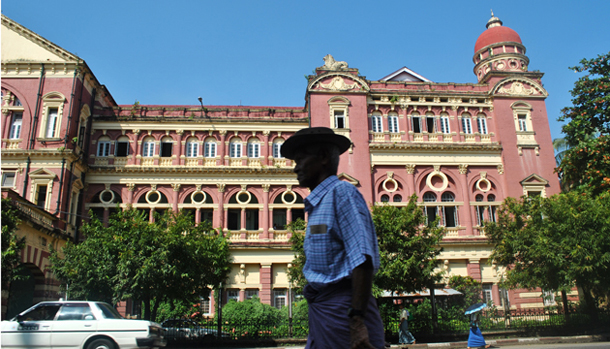RANGOON — One of the world’s largest multinational electronics companies is looking to help enhance the nighttime appeal of Rangoon by illuminating the city’s colonial-era buildings with light-emitting diode (LED) lights.
The Amsterdam-based Philips has proposed that the Yangon City Development Committee (YCDC) oversee the project, which would include lighting City Hall and other historical buildings located around Maha Bandoola Park in the downtown area, according to the Yangon Heritage Trust (YHT). YHT’s mission is to promote and protect Rangoon’s architectural heritage as part of a comprehensive urban planning process.
“Philips has proposed the YDC for lights decoration and we have supported it,” said Moe Moe Lwin, director of the YHT. “The plan, however, depends on how Philips can carry out the project with minimum cost and whether the YDC can afford it.”
Details have yet to be made available on how the Dutch company will illuminate those structures in a country where blackouts are frequent.
In the meantime, state-run newspapers on Thursday quoted Thant Myint-U, the founder and chairman of the YHT board, saying Philips and the YHT had agreed, on the sidelines of the World Economic Forum gathering in Naypyidaw, to preserve historical buildings in Rangoon.
In accordance with the agreement, Philips will initially provide US$75,000 to create and affix plaques to some of these buildings, with inscriptions offering brief histories of the aging structures, the newspapers said.
Philips once exported an array of electronics to Burma, such as radios, light bulbs, irons, fans and televisions. It left the country, however, following the imposition of economic sanctions on the previous military regime by the European Union.
The Dutch company recently returned to the Southeast Asia nation’s market, according the Wall Street Journal, after EU sanctions were lifted in April, with Philips opening its first electronics shop in Rangoon last month.
There are reportedly about 200 colonial-era buildings in downtown Rangoon and surrounding townships such as Kyauktada, Botahtaung and Latha, which are considered heritage sites.
In the past, many more of these buildings, most of which were privately owned, were reportedly demolished by businessmen and replaced with apartments.
However, since the formation of the YHT, the YCDC has made a concerted effort to prevent developers from destroying them.
Historical buildings in downtown Rangoon including the Ministers’ Office, formerly known as the Secretariat, the High Court building and the main Rangoon Railway Station are currently undergoing renovations carried out by private companies.
The YHT is compiling a list of buildings in Rangoon that are more than 50 years old and has so far documented about 1,000 in downtown and nearby areas alone.
















